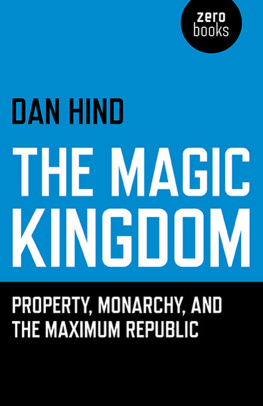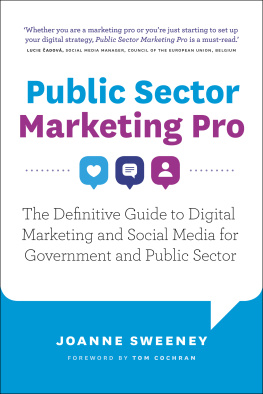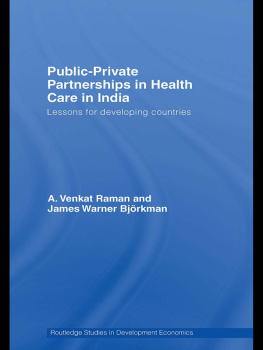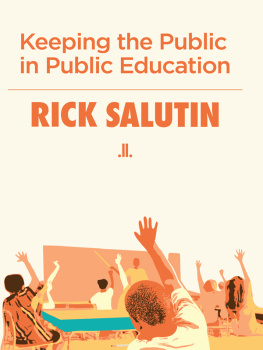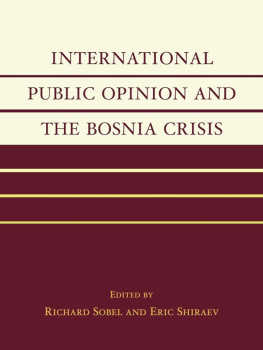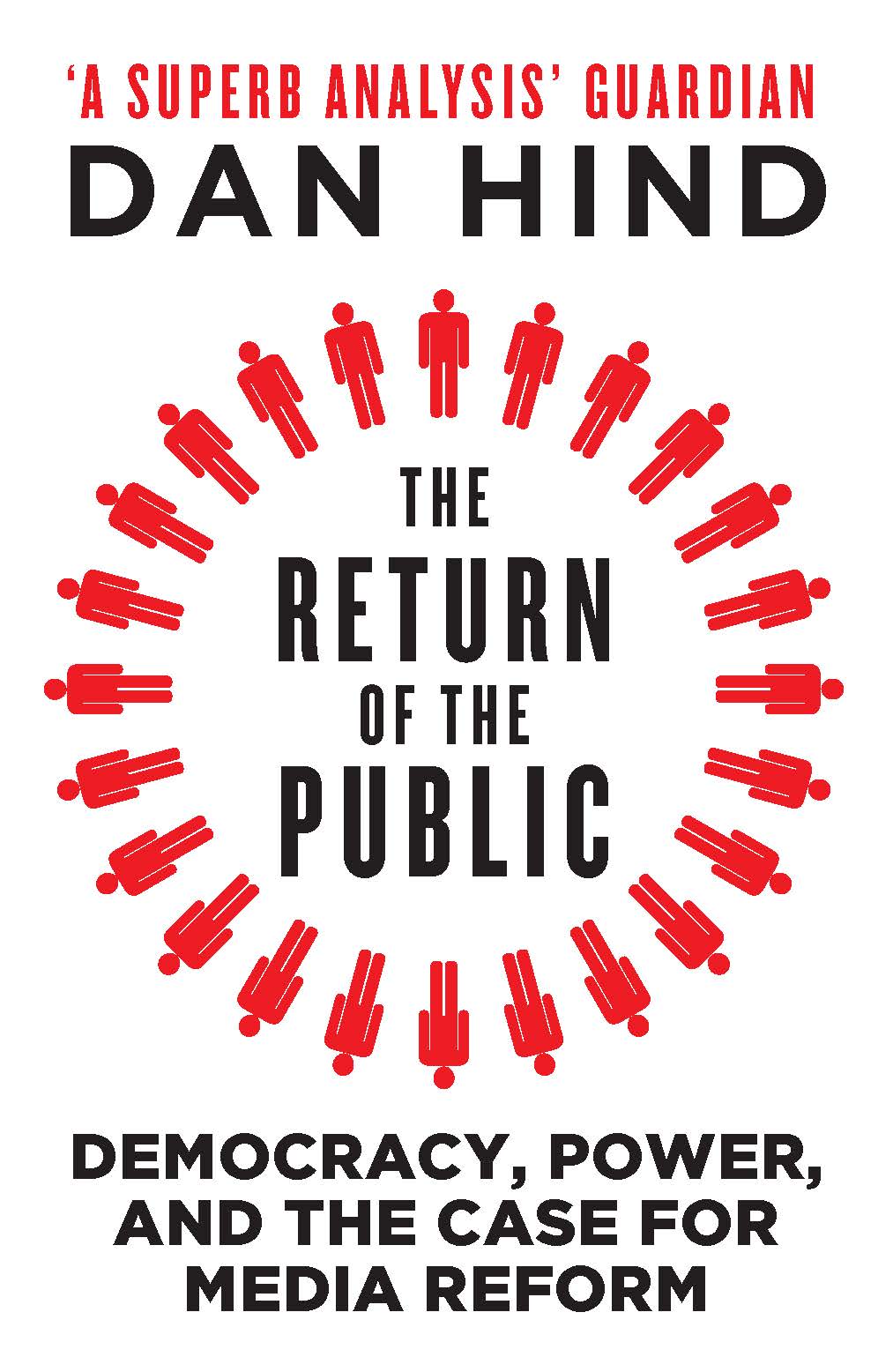
The Return of the Public
DAN HIND

This paperback edition first published by Verso 2012
First published by Verso 2010
Dan Hind 2010
All rights reserved
The moral rights of the author have been asserted
1 3 5 7 9 10 8 6 4 2
Verso
UK: 6 Meard Street, London W1F 0EG
US: 20 Jay Street, Suite 1010, Brooklyn, NY 11201
www.versobooks.com
Verso is the imprint of New Left Books
Epub ISBN-13: 978-1-84467-910-2
British Library Cataloguing in Publication Data
A catalogue record for this book is available from the British Library
Library of Congress Cataloging-in-Publication Data
A catalog record for this book is available from the Library of Congress
The aristocrats of intelligence find that there are truths which should not be told to the people. As a revolutionary socialist, and a sworn enemy of all aristocracies and all tutelage, I believe to the contrary that the people must be told everything. There is no other way to restore them to their full liberty.
Mikhail Bakunin
Contents
Introduction
In a democracy public opinion is sovereign
Alexis de Tocqueville
F OR THE LAST 30 years American and British politicians have allowed powerful economic interests to manage their own affairs. Whether liberal, nominally social democratic or conservative, successive governments assured voters that their surrender to market forces served the public interest. Once freed from an intrusive state, self-interested investors would identify economic opportunities and deliver faster economic growth. Privatized companies would become dynamic and efficient. Finance could be left to regulate itself, while government became more business-like. The majority would benefit from governments refusal to restrain market forces or to take action in the economy: whatever investors wanted was good for growth and so, by definition, was in the common interest.
In the summer of 2007 the financial markets, which had epitomized the way that private self-interest was supposed to deliver public goods, began to seize up. In the months and years that followed, governments around the world, led by the United States and Britain, committed billions to rescue failing financial institutions and lent billions more at very low levels of interest. The working majority, having been told for a generation that deregulated finance would bring them their hearts desires, discovered that they were suddenly liable for huge new debts. Though the profits of the preceding decades went disproportionately to the wealthy, the losses belonged to everyone. The financial sector had justified its vast profits as the fruits of prudent risk-taking in competitive markets. It was now clear that their private gains had accrued from the reckless exploitation of a public guarantee.
For a while, the bankruptcy of the conventional wisdom could be discussed openly. Speaking in October 2008 Alan Greenspan, the former head of the Federal Reserve, acknowledged that the whole intellectual edifice for managing risk in the vast global market for derivatives had collapsed in the summer of the previous year. Greenspan admitted that he had found a flaw in the ideology that had guided him during his tenure at the Federal Reserve:
I dont know how significant or permanent it is. But I have been very distressed by that fact... I made a mistake in presuming that the self-interests of organisations, specifically banks and others, were such that they were best capable of protecting their own shareholders and their equity in the firms.
By the time the financial crisis broke, the ideology that guided Greenspan at the Federal Reserve had spread throughout the state administration. In Michael Sandels words, for three decades, the governing philosophy of the United States and Britain was defined by the faith that markets are the primary instrument for achieving the public good. Those who doubted the power of self-interest to prevent systemic collapse struggled to be heard in an intellectual edifice that, though gimcrack, had been lavishly soundproofed by Greenspan and his friends in finance, academia and the media.
We have been through a severe recession and are now being told by Larry Summers, one of Barack Obamas senior economic advisors and a partner of Greenspan in the deregulation of finance, that we can look forward to a statistical recovery and a human recession. Summers explains that higher levels of unemployment are a structural feature of the US economy and will not fall when the business cycle turns. Many of those who have lost their jobs will not find new ones. Meanwhile the financial markets are demanding cuts in state expenditure to reduce ballooning fiscal deficits. Even a statistical recovery is in jeopardy. The financial markets insistence that governments cut deficits while leaving the rich only lightly taxed will weaken demand and may even choke off the recent return to growth.
The events of 2007 and the ensuing shambles should have put to rest the interconnected assumptions that defined and limited our sense of what was politically and economically possible. They should have emboldened us to consider what it would mean to live in a functioning democracy and to discuss the reforms that are needed if we are to avoid the grotesque future mapped out for us and for our children, in which we struggle under the burden of debts to which we did not consent, the consequence of a crisis we did not cause. The arguments used to deny the general population a meaningful role in shaping policy fell apart when private self-interest drove the financial system to the point of collapse and state intervention saved it. Those who, for a generation, dominated the management of the economy, and hence the substance of politics, should no longer be allowed to set the terms of the debate.
Yet as I write most of us can only watch as the architects of the old order insist on their right to remain in control while denying that they might be responsible for the crisis they caused. In former Treasury Secretary Hank Paulsons words, we are all on the hook for the system we all let happen. So now we must reduce the deficit to restore the animal spirits of the financial markets. There has been little open debate about how the deficit is to be reduced. The glut of capital in the offshore system remains weirdly invisible to most mainstream commentators and the interlocking claims and descriptions that constitute the global media have survived more or less intact. The dizzying inequality, the gigantic infrastructure of military power, the deepening social and environmental problems, all remain beyond the reach of democratic debate. We are expected to pay up and keep quiet.
The peoples of Britain and the United States are now on the hook for more than 13 trillion dollars ($13,000,000,000,000). Money borrowed to rescue the banks has joined vast sums spent on weapons procurement and the steady enrichment of contractors against a background of escalating tax avoidance and evasion by the very rich. This book sets out the terms on which we should accept responsibility for these debts after a generation of fairy tales, close confinement and abuse. The current economic crisis should be seen as an opportunity to revise the ways in which we engage with powerful economic institutions, with the state and with one another.
The book contributes to this process of revision in three ways. Firstly, it sets out how we have tended to construe the idea of the public. A clear understanding of what it means to act in a public capacity and to engage in public life is central to a properly political identity. The current definitions of the public and the assumptions that shaped them have helped bring us to our current condition. Yet our sense of what the word means is often confused and contradictory. In ordinary speech we contrast the private world of family and friends with the world outside, the public world of strangers. Yet the public sector that is, the state and the private sector that is, business are both public in this first sense. In the last three centuries production has expanded beyond the household and made it seem natural to think of the economy as an aspect of public life in a way that would have been wholly alien to earlier generations.
Next page

